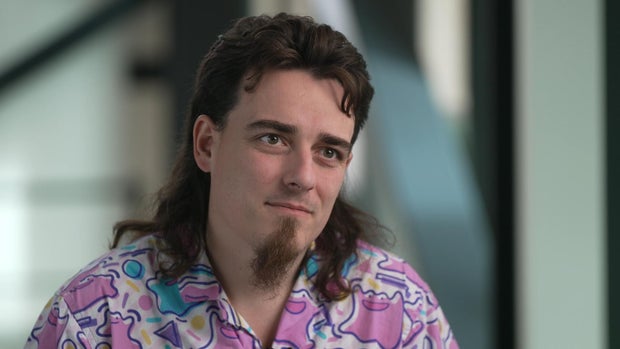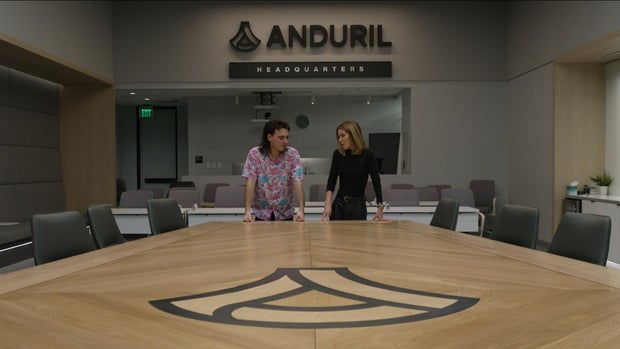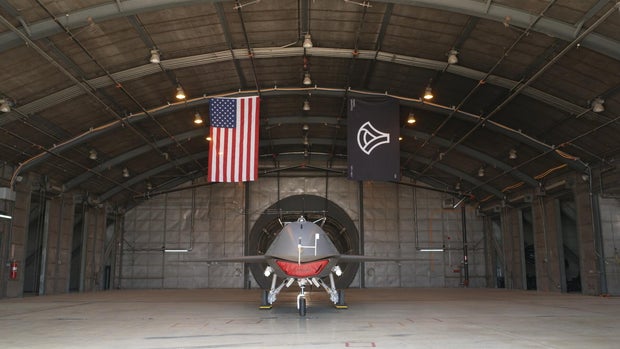Tech billionaire Palmer Luckey wants to remake the U.S. military with autonomous weapons
People thought flip flop- and Hawaiian shirt-wearing tech billionaire Palmer Luckey, 32, was nuts when he launched defense products startup Anduril Industries.
There hadn't been a new company in the defense industry in any significant way since the end of the Cold War, but Luckey had his own vision for the future of warfare: one with autonomous, AI-powered weapons and a different business model than the five "prime" defense contractors in the U.S.
"I've always said that we need to transition from being the world police to being the world gun store," he said.
Who is Palmer Luckey?
Luckey made his billions young. He grew up fascinated by electronics and spent a lot of time tinkering in his parents' Long Beach, California, garage.
By age 19, that tinkering turned into virtual reality company Oculus. Luckey sold it to Facebook for $2 billion in 2014, but was fired by Facebook two years later.
"Everyone's got a different story, but it boils down to I gave $9,000 to a political group that was for Donald Trump and against Hillary Clinton," Luckey said. "To be a Trump supporter in 2016, you know, this was at the height of the election insanity and derangement in Silicon Valley. And so I think that a lot of people thought back then that you could just fire a Trump supporter."
Facebook founder Mark Zuckerberg, who attended President Trump's most recent inauguration, has denied that Luckey was fired for his political views.
In 2017, Luckey says he left Silicon Valley, with hundreds of millions of dollars in the bank and a chip on his shoulder.
"My gears were ground," he said. "I really wanted to prove that I was somebody, that I was not a one-hit wonder, and that I still had it in me to do big things."
Luckey says he thought about starting companies to combat obesity or fix the prison system, but ultimately decided to break into the defense industry.
"Everyone in the military has seen 'James Bond' movies and they all like Q," Luckey said. "I'm the wacky gadget man. I'm the guy who types on the computer and pushes up my glasses, and then gives them a strange thing to help them accomplish their mission."
What Luckey sees as the future of warfare
For decades, Lockheed Martin, Boeing, Raytheon, General Dynamics and Northrop Grumman have dominated the defense industry. Typically, the companies present an idea to the Pentagon. If the Pentagon buys it, the government pays for the company to develop it, even if it goes over budget or over schedule.
Luckey started Anduril to flip that procurement structure on its head.
"The idea behind Anduril was to build not a defense contractor, but a defense products company," he said.
The difference, he explains, is that contractors are paid to do the work whether or not it succeeds.
"A products company has a very different mentality. You're putting in your own money. You're putting in your own time," Luckey said.
His vision was to show up with a working product, not with a presentation describing how taxpayers would foot his bills for developing a product.
Luckey argues a lack of innovation in the defense sector means a Tesla has better AI than any U.S. aircraft and a Roomba vacuum has better autonomy than most of the Pentagon's weapons systems. He wants to change that.
Part of Luckey's philosophy is that autonomous weapons ultimately promote peace by scaring adversaries away.
"My position has been that the United States needs to arm our allies and partners around the world so that they can be prickly porcupines that nobody wants to step on, nobody wants to bite them," he said.
Luckey does not believe the U.S. should be sending its military to other countries. Instead, he says, American-made products should go overseas.
"I think that that's one of the reasons that autonomy is so powerful. Right now there are so many weapon systems that require manning," he said. "You know, if I can have one guy command and controlling 100 aircraft, that's a lot easier than having to have a pilot in every single one. And it puts a lot fewer American lives at risk."
"Autonomy" does not mean remote controlled; once an autonomous weapon is programmed and given a task, it can use artificial intelligence for surveillance or to identify, select and engage targets. No operator needed.
What Anduril is making
Luckey's approach seems to be working for Anduril. The company says it will have secured more than $6 billion in government contracts worldwide by the end of the year. Some of Anduril's systems are already being used by the U.S. military and in the war in Ukraine.
Right now, Anduril is working on the Roadrunner: a twin turbo-jet powered drone interceptor that can take off, identify and strike a drone. If it doesn't find a target, it can land and try again.
Anduril also makes headsets that allow soldiers to see 360 degrees in combat. And there's an electromagnetic warfare system that can be programmed to jam enemy systems, knocking out drone swarms.
The weapons can be synchronized on Anduril's AI platform, Lattice, Luckey said. The platform collects data from various sensors and sources — including satellites, drones, radar and cameras — allowing the AI to analyze, move assets and execute missions faster than a human.
"It's the AI onboard all these weapons that makes it possible to make it so easy," he said.
The largest weapon in Anduril's arsenal, a submarine called the Dive XL, works autonomously. A version 60 Minutes saw is the size of a school bus.
"It's not remote-controlled by this computer," Luckey said. "It's doing it on the brain, on the submarine itself. So if I told it to go off and perform some mission that's monthslong, like, 'Go to this target, listen for this particular signature, and if you see this signature, run; if you see this one, hide; if you see this one, follow it,' it could do that all on its own without being detected, without communicating with it."
Anduril says the Dive XL can travel 1,000 miles fully submerged. Australia has invested $58 million in the subs to help defend its seas from China.
Anduril's most anticipated weapon, an unmanned fighter jet called Fury, has no cockpit, stick or rudder because there's no pilot.
"The idea is that you're building a robotic fighter jet that is, you know, flying with manned fighters and is doing what you ask it to do, recommending things be done, taking risks that you don't want human pilots to take," Luckey said.
Fury represents a big turning point for the company. Anduril was viewed by some inside the defense industry as a "tech-bro" startup until it beat out several of the prime defense contractors to make an unmanned fighter jet for the Air Force.
Fury is scheduled to take its first test flight this summer. If the Pentagon awards Anduril a production contract for Fury it, like all of the company's products, will be made in the U.S.
The ethics of autonomous weapons
The secretary general of the United Nations has called lethal autonomous weapons "politically unacceptable and morally repugnant." Some international groups have referred to lethal autonomous weapons as killer robots.
"If I am gonna argue with them, I usually poke it," Luckey said. "I'm like, 'OK, so do you think that NATO should be armed with squirt guns or slingshots?'"
Luckey notes that all of Anduril's weapons have a "kill switch" that allows a human operator to intervene if needed. And while some find the idea of autonomous weapons scary, Luckey argues they're less scary than weapons systems without any level of intelligence.
"There's no moral high ground to making a land mine that can't tell the difference between a school bus full of children and Russian armor," he said. "It's not a question between smart weapons and no weapons. It's a question between smart weapons and dumb weapons."
As with many AI systems, some people also worry about what happens if artificial intelligence goes rogue.
"I would say that it is something to be aware of. But in the grand scheme of things, things to be afraid of, there's things that I'm much more terrified of," Luckey said. "I'm a lot more worried about evil people with mediocre advances in technology than AI deciding that it's gonna wipe us all out."






